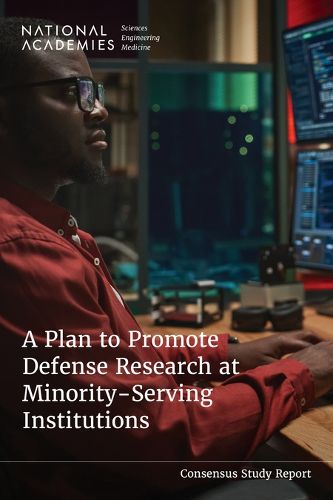Readings Newsletter
Become a Readings Member to make your shopping experience even easier.
Sign in or sign up for free!
You’re not far away from qualifying for FREE standard shipping within Australia
You’ve qualified for FREE standard shipping within Australia
The cart is loading…






Engaging the full breadth of talent in the United States is an important component of growing and sustaining dominance in research and development (R&D) and supporting national security into the future. By 2030, one-fifth of Americans will be above age 65 and at or nearing retirement from the workforce. Estimates of race and ethnic demographic changes between 2016 and 2030 show a decrease in the non-Hispanic white population and an increase in terms of both number and share of all other demographic groups, and this trend will continue to increase. These population shifts signal a citizenry and workforce that will be increasingly diverse. For the United States to maintain its global competitiveness and protect its security interests, targeted support is needed to cultivate talent from communities throughout the nation.
The nation's more than 800 Minority-Serving Institutions (MSIs) provide an impactful and cost-effective opportunity to focus on cultivating the current and future U.S. population for careers in science, technology, engineering, and mathematics (STEM), including in fields critical to the U.S. Department of Defense (DOD). At the request of DOD, this report identifies tangible frameworks for increasing the participation of MSIs in defense-related research and development and identifies the necessary mechanisms for elevating minority serving institutions to R1 status (doctoral universities with very high research activity) on the Carnegie Classifications of Institutions of Higher Education scale.
Table of Contents
Front Matter Summary 1 Introduction 2 Government Engagement with Minority-Serving Institutions: History and Common Themes from Previous Reports 3 Outlining Opportunities at MSIs: An Assessment of the Capabilities of Minority-Serving Institutions 4 Department of Defense and Other Federal Support for Research and Development 5 Setting a Path Forward for Assessment and Decision-Making 6 Conclusion Appendix A: Public Meeting Agendas Appendix B: Committee Biographical Sketches Appendix C: Section 233 of Relevant NDAA Legislation
$9.00 standard shipping within Australia
FREE standard shipping within Australia for orders over $100.00
Express & International shipping calculated at checkout
Engaging the full breadth of talent in the United States is an important component of growing and sustaining dominance in research and development (R&D) and supporting national security into the future. By 2030, one-fifth of Americans will be above age 65 and at or nearing retirement from the workforce. Estimates of race and ethnic demographic changes between 2016 and 2030 show a decrease in the non-Hispanic white population and an increase in terms of both number and share of all other demographic groups, and this trend will continue to increase. These population shifts signal a citizenry and workforce that will be increasingly diverse. For the United States to maintain its global competitiveness and protect its security interests, targeted support is needed to cultivate talent from communities throughout the nation.
The nation's more than 800 Minority-Serving Institutions (MSIs) provide an impactful and cost-effective opportunity to focus on cultivating the current and future U.S. population for careers in science, technology, engineering, and mathematics (STEM), including in fields critical to the U.S. Department of Defense (DOD). At the request of DOD, this report identifies tangible frameworks for increasing the participation of MSIs in defense-related research and development and identifies the necessary mechanisms for elevating minority serving institutions to R1 status (doctoral universities with very high research activity) on the Carnegie Classifications of Institutions of Higher Education scale.
Table of Contents
Front Matter Summary 1 Introduction 2 Government Engagement with Minority-Serving Institutions: History and Common Themes from Previous Reports 3 Outlining Opportunities at MSIs: An Assessment of the Capabilities of Minority-Serving Institutions 4 Department of Defense and Other Federal Support for Research and Development 5 Setting a Path Forward for Assessment and Decision-Making 6 Conclusion Appendix A: Public Meeting Agendas Appendix B: Committee Biographical Sketches Appendix C: Section 233 of Relevant NDAA Legislation